The hospitality landscape continues to evolve rapidly, driven by the changing expectations of today’s modern travelers. From personalized guest experiences to seamless automation, smart hotel technology is playing a central role in revolutionizing the industry.
With almost 78 percent of surveyed hoteliers across the globe planning to increase their technology investment over the next couple of years, hotel and resort operators can’t afford to lag behind. Ready to get smart? Here are some of the top smart hotel technology trends to consider for 2024.
What Is Smart Technology?
Smart hotel technology refers to devices or systems that are equipped with sensors, connectivity features, and “intelligent” capabilities that allow them to collect data, automate processes, and execute advanced functionalities, such as remote control.
Most of the time, the underlying structure behind smart technology is the IoT (Internet of Things), a network of interconnected electronic devices equipped with features that allow them to share complex data with each other. Smart technology, especially when paired with IoT, makes it possible for hotels to offer tailored experiences and automated processes to their guests as well as optimize their internal operations.
What Are the Benefits of Smart Hotel Technology?
There are many reasons to harness smart hotel technology, from optimizing guest experiences to streamlining internal processes:
- Elevate the guest experience: Smart technology allows today’s guests to get the personalized, on-demand experiences they’re looking for. A recent survey found that 73 percent of travelers are more likely to choose a hotel with self-service technology options. This allows guests to customize their own amenities, entertainment, and staff interactions, which leads to a more satisfying experience overall.
- Foster sustainable practices: Smart hotel technology makes it easier to conserve power, reduce waste, and allocate resources. In fact, 84 percent of IoT deployments are helping or have the potential to help businesses meet the UN’s Global Sustainable Development Goals. Smart hotel devices can monitor energy consumption, inventory management, air and water quality, and noise levels to decrease a property’s environmental impact — and, not to mention, save on energy costs.
- Boost operational efficiency: A smart PMS (Property Management System), which utilizes IoT technology to integrate with other hotel systems and devices, can automate many routine operations such as reservations, check-ins and outs, billing and reporting, room assignments, housekeeping schedules, and more, as well as offer real-time analytics for informed decision-making. 95% of hoteliers agree that a next-generation PMS can streamline hotel operations and reduce operating costs.
- Collect data-backed insights: IoT device sensors collect data from their environments, then transmit it to a central hub for analysis. This data can offer valuable information on guest preferences, interactions, behaviors, demographics, and more, so hotel staff can respond effectively.
- Maintain a competitive edge: Seamless digital experiences and amenities can differentiate a hotel from its competitors and attract more guests seeking modern, tech-savvy accommodations. Offering these services can also lead to more positive ratings or reviews, which is important since 57 percent of global travelers read online consumer reviews before they book a hotel.
Smart Hotel Technology: 8 Trends to Elevate Your Property in 2024
Some smart hotel technology trends (i.e., IoT door locks and remote check-in capabilities) are quickly becoming the norm in hotels everywhere, while others are more exclusive to upscale or boutique establishments.
Still, there’s no question that smart technology innovations are here to stay, and hotels will continue to adopt these solutions at an accelerated pace. Here are eight of the most popular ways smart technology is being used in the hotel industry in 2024.
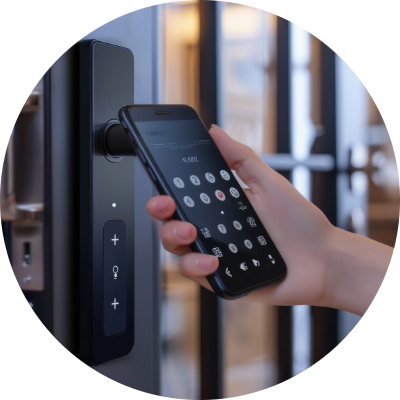 Keyless Entry Systems
Keyless Entry Systems
Thanks to today’s smart technology, guests no longer have to remember to bring a key whenever they leave their rooms, then return it before checking out. Instead, they can either use a mobile phone or a hotel-issued electronic smart card to access their rooms. This eliminates the need for a manual key altogether, which reinforces security measures and optimizes convenience.
- Contactless Check-Ins
With contactless check-in software, guests can book a reservation, finalize the payment details, then remotely check into (or out of) a hotel. This streamlines the entire process without a need to touch any surfaces or interact with staff members. Contactless check-in is integrated with the hotel’s PMS platform to secure guest information and facilitate communication with the concierge and the other departments to offer assistance if necessary.
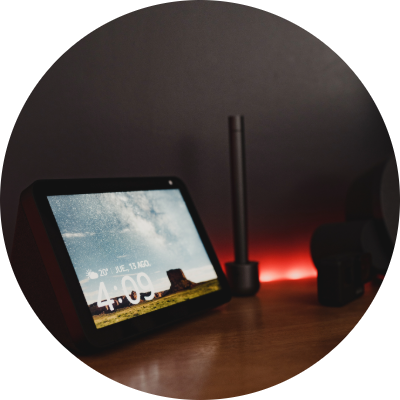 In-Room Virtual Assistants
In-Room Virtual Assistants
Many hotels equip rooms with smart virtual assistants programmed to offer uniquely curated services to each room occupant. Based on guest preferences and other real-time data insights, these virtual assistants can schedule spa appointments, recommend activities or dining options, arrange transportation, contact hotel employees, and more.
- Smart Room Controls
More and more hotels are installing smart room controls in hotels so that guests can adjust aspects of their environment for maximum comfort. These devices run on a centralized IoT hub, allowing each room occupant to customize the lights, temperature, window blinds, TV channel or volume, and other elements to their own specifications through an intuitive interface like a mobile application, voice command sensor, or touch panel.
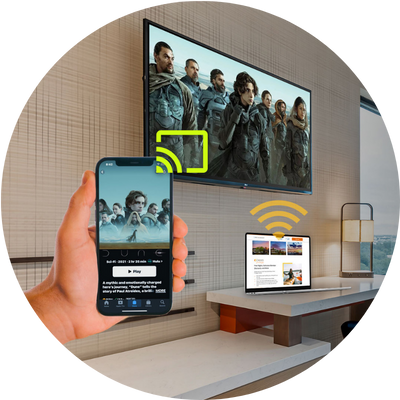 Guestroom Technologies
Guestroom Technologies
Personalized, on-demand in-room entertainment is more accessible than ever, thanks to smart TVs, hotel casting systems that are accessible with QR code scanning, wireless charger stations, Bluetooth speakers, and other devices that utilize smart technology.
- Employee Panic Buttons
This smart hotel technology solution is no longer a nice-to-have but has become an expectation among staff. Discreet 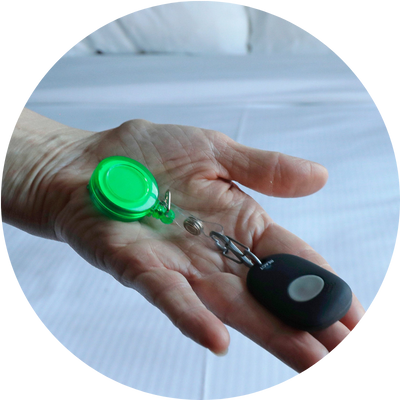 wearable panic buttons can protect hotel employees from harassment, assault, or medical emergencies on the job. These panic buttons feature a hands-free activation mechanism and a GPS location tracker that’s wirelessly connected to Wi-Fi or Bluetooth. If a staff member feels threatened, they can alert the hotel security and local authorities for immediate help.
wearable panic buttons can protect hotel employees from harassment, assault, or medical emergencies on the job. These panic buttons feature a hands-free activation mechanism and a GPS location tracker that’s wirelessly connected to Wi-Fi or Bluetooth. If a staff member feels threatened, they can alert the hotel security and local authorities for immediate help.
- Occupancy Level Detectors
Automated sensors and thermostats located in each guestroom and all over the property can help hotels save on total energy consumption based on current occupancy levels. These sensors detect whenever a room is vacant or a common area isn’t filled to capacity, and then adjust the light fixtures, HVAC units, and water flow accordingly.
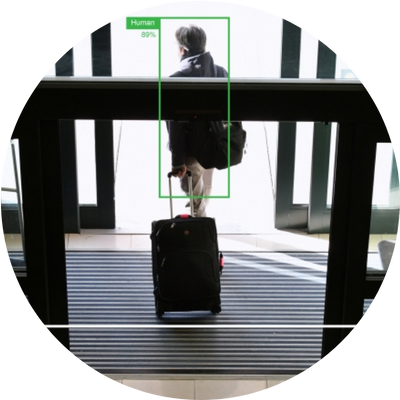 Security and Surveillance
Security and Surveillance
In order to enhance the safety of both guests and staff members, hotels often deploy smart surveillance technologies around the premises. This includes access control systems, live-feed CCTV (closed-circuit television) cameras, and automatic motion sensors. More hotels are also starting to utilize artificial intelligence (AI) solutions to monitor any suspicious behavior onsite along with smart facial recognition software.
Best Practices for Implementing Smart Hotel Technology
When adopting smart hotel technology, it’s important to have the right capabilities and strategies in place for a smooth and successful transition. The include:
- Reliable Infrastructure: It’s crucial to have a robust network infrastructure to manage and operate the communication between IoT devices. This includes fast, stable Wi-Fi, Bluetooth, and Zigbee coverage and connectivity with strong bandwidth across the whole premises, so all the smart electronics, sensors, room controls, security alarms, data analytics platforms, and other systems are able to function and share information reliably. Utilizing a comprehensive solution like the RUCKUS IoT Suite ensures that hotel and resort environments can adopt a single network capable of consistently providing high-performance quality and centralized management for all IoT platform needs.
- Integration Capabilities: To create an interconnected guest experience, hotels must ensure that new smart technology solutions are compatible with their existing PMS and booking platforms, customer relationship management (CRM) software, point-of-sale tools, and other relevant programs. Utilize open Application Programming Interfaces (APIs) or middleware operating systems to streamline the integration.
- Guest Privacy and Security: The more hotels collect, store, and analyze private data, the more essential it becomes to implement cybersecurity measures. All hotels should comply with data protection regulations and take precautions to shield guest information from unauthorized access or security breaches. For instance, encrypt all sensitive data storage, install two-step verification controls, update software and firmware, conduct regular security audits, and train staff on data handling best practices.
Level-Up Your Daily Operations with Smart Hotel Technology
Smart hotel technology represents the next level in optimizing workflows, elevating the guest experience, increasing revenues, and maintaining a competitive edge. Hotel Internet Services offers robust and reliable hospitality Wi-Fi solutions, tailored to meet your specific business needs, so you can effectively leverage smart technology and deliver top-notch service that will keep guests coming back. Learn more RUCKUS IoT Suite and how it can provide your hospitality environment with the robust infrastructure needed to effectively manage all your IoT devices.
